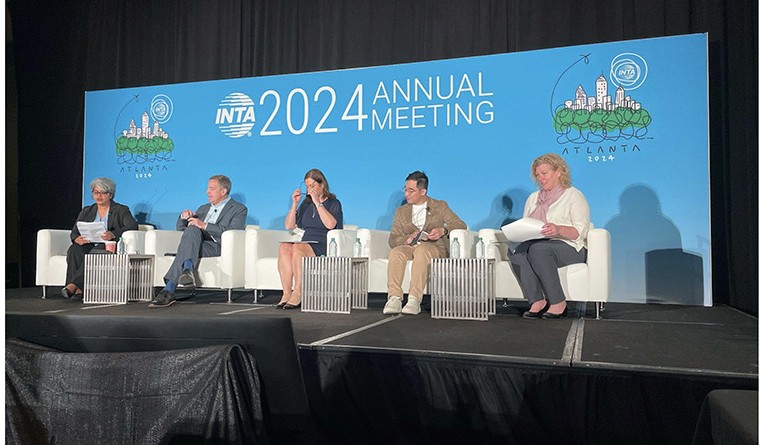INTA 2024: IP ‘more resilient’ to recession than some other industries
22 May 2024

Intellectual property firms are better positioned than some industries to withstand the impact of a recession and can still find opportunities despite an economic downturn.
The panel at the INTA 2024 session on “IP and Recession” discussed the potential impact of a recession on the IP practice, saying that this would include a slowdown in trademarks and patent filings, litigations, and acquisitions as firms become more financially cautious. Additionally, some companies may consider divesting certain assets as they reassess their portfolios due to the uncertainty.
“During a recession, companies may be less willing to pay for licensing fees, which will result in a decrease in revenue for IP stakeholders. As a general rule, companies may be more reluctant to engage in expensive IP litigation,” said Barry L. Cohen, a partner at Royer Cooper Cohen Braunfeld in Allentown, Pennsylvania, while noting that with the recession, there could also be an “increase in counterfeit activities.”
Donna Short, a partner at Addisons in Sydney, said some of the recession’s major impacts on the IP ecosystem include reduced budgets as businesses focus on their core brands. This tighter budget would also mean a decrease in litigation, negatively impacting law firms.
“Overall, a recession will have some negative impacts and generally, work does decrease. People or businesses are less likely to expand their portfolio, and even on the maintenance side, during a recession, companies might do a clean-up of their portfolio and trademarks that they are not using. So generally, there will likely be less enforcement,” she said.
Staffing also suffers, and there tends to be a “massive decline in M&A activities” as companies shy away from making acquisitions.
“However, the companies that do make acquisitions are going to get the IP assets at a lower cost. So if they do acquire IP assets during a recession, IP assets in the long term will likely increase, so they’re going to reap those benefits in the long term,” Short said.
Alban Kwan, regional director of East Asia, CSC Digital Brand Services in Hong Kong, noted that during recessions, there are also expectations of an increase in online infringement.
“The main impact is that most people expect that there will be an increase in brand infringement. However, it seems like [practitioners] do not have a very good understanding of how to handle it,” he said, citing results of a recession survey done by INTA.
Short pointed out that, related to the recession, the events during Covid-19 were “unique,” as IP firms also saw increased activity despite a general business slowdown.
“During Covid-19, there was a massive economic shutdown, but the Covid-19 recession was quite unique. The response of the IP systems during this recession demonstrated its resilience and adaptability, as investments in trademarks, patent filings, and licensing actually played a critical role in overcoming the crisis,” she said.
“So, during the Covid-19 pandemic, there were many new businesses, particularly start-ups, for new products and services, which led to the creation of new brands and trademark filings,” Short added. “Therefore, it’s not always the case that a recession will actually have a negative impact on IP filings.”
A recession could also present opportunities for IP firms.
“In one study, McKinsey noted that law firms can often withstand recessions better than other sectors and other industries,” Cohen said.
“One of the reasons for that is that certain tech litigation will actually increase during a recession. Bankruptcy work – especially distressed assets legal work—will increase during a recession. And some litigation can also be a source of revenue for companies during a recession,” Cohen added.
The panel then suggested practical solutions that IP firms could turn to during recessions.
“You need to be far more strategic during a recession. So, advise clients, particularly, to focus on core markets and core countries,” Short said. On the staffing front, a lot of the production work and procedure work can be pushed down to paralegal to try and reduce cost.”
Kwan, for his part, said firms could use technology to boost their efficiency and help weather the recession’s impact – although he warned that technology adoption is all about “timing.”
“We should recognize the importance of online infringement because it’s definitely going to go up,” he added. “At a time of recession, some of the litigation could be a source of income; online infringement could be the same. Online infringement could be a source of income for law firms as well.”
Cohen said the recession also presents opportunities for smaller law firms in smaller cities that may have lower hourly rates than larger firms in major cities. “At the same time, there are certainly opportunities for larger firms or law firms in larger cities to find efficiencies in working with their clients through fixed fees.”
Firms could also look at “other legal work and other legal markets, such as distressed businesses and other related litigation, to generate additional revenue for the law firms and the companies that they represent.”
“This could be a more detailed look into enforcement programs and IP protection to increase value and drive revenue through increased licensing programs,” Cohen said. He added that litigation funding is also another area to explore.
“Finally, another area that may help during the recession is an increased focus on IP reporting and valuation for companies. This will drive the increased value of the IP, which would allow companies to obtain new sources of revenue and new investments.”
“So the theme here is while there is a recession, there are silver linings and opportunities to look for,” Cohen further said.
- Charlee C. Delavin, reporting from Atlanta






